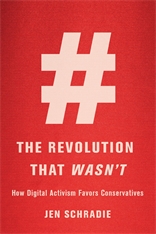 While democrats once believed that innovations in information and communications technology and data analysis would promote more open societies, the actual effects of these tools have been mixed, according to Naazneen Barma, Brent Durbin and Andrea Kendall-Taylor.* Authoritarians are using technology to deepen their grip internally, spread propaganda, undermine basic human rights, promote illiberal practices beyond their borders, and erode public trust in open societies, they write for War On The Rocks:
While democrats once believed that innovations in information and communications technology and data analysis would promote more open societies, the actual effects of these tools have been mixed, according to Naazneen Barma, Brent Durbin and Andrea Kendall-Taylor.* Authoritarians are using technology to deepen their grip internally, spread propaganda, undermine basic human rights, promote illiberal practices beyond their borders, and erode public trust in open societies, they write for War On The Rocks:
Today, Russia continues its campaign of cyber and information attacks against democratic institutions and social cohesion in the United States and Europe. Iran and North Korea are following suit. The Chinese Communist Party is forging a future of mass surveillance and “social credit” scores, and rapidly exporting those tools to other parts of the world. Autocratic governments seem to be outpacing free societies in harnessing new technologies to advance their political goals.
To understand how authoritarian regimes are using these tools to control their populations and disrupt democratic societies, Bridging the Gap and the Center for a New American Security brought together a community of researchers and policymakers to address these questions. Participants included experts from Congress, the State Department, the National Security Council, as well as outside scholars who prepared research-based memoranda for discussion. This introductory article kicks off a short series on this important topic.
 A recent analysis casts doubt on the democratizing power of digital activism.
A recent analysis casts doubt on the democratizing power of digital activism.
While hashtag activism – from the Arab Spring and Occupy Wall Street to Black Lives Matter and #MeToo – captures headlines, conservative digital activism is proving more effective on the ground, the Stanford Center on Philanthropy and Civil Society observes. Jen Schradie’s book, The Revolution That Wasn’t (Harvard University Press), identifies the reasons behind this previously undiagnosed digital-activism gap. Large hierarchical political organizations with professional staff can amplify their digital impact, while horizontally organized volunteer groups tend to be less effective at translating online goodwill into meaningful action. Not only does technology fail to level the playing field, it tilts it further, so that only the most sophisticated and well-funded players can compete.
*Naazneen Barma is associate professor of national security affairs at the Naval Postgraduate School, co-director of Bridging the Gap, and a 2019–2020 Berggruen fellow. She is author of The Peacebuilding Puzzle and her research centers on global governance and international engagement in post-conflict and developing countries. Brent Durbin is associate professor of government at Smith College, co-director of Bridging the Gap, and a 2019–2020 Berggruen fellow. He is author of The CIA and the Politics of U.S. Intelligence Reform. His current research focuses on the political and social effects of new data technologies. Andrea Kendall-Taylor is a senior fellow and director of the Transatlantic Security Program at the Center for a New American Security. She is a co-author of Democracies and Authoritarian Regimes. Her research focuses on Russia, authoritarianism, and national security challenges facing the United States and Europe.







